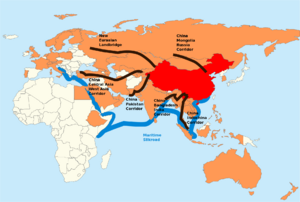More languages
More actions
Jucheguevara (talk | contribs) (added source) Tag: Visual edit |
Jucheguevara (talk | contribs) (minor language alteration) Tag: Visual edit |
||
| Line 11: | Line 11: | ||
The BRI has been demonized by Western [[bourgeois media]] on the basis that it's a "debt trap"<ref>{{News citation|title=China's debt-trap diplomacy|url=https://thehill.com/opinion/international/551337-chinas-debt-trap-diplomacy|newspaper=The Hill}}</ref> or an example of so-called "Chinese imperialism," but these claims serve only propaganda purposes and are not founded in evidence.<ref>{{News citation|title=Debunking the Myth of ‘Debt-trap Diplomacy’|url=https://www.chathamhouse.org/2020/08/debunking-myth-debt-trap-diplomacy|newspaper=Chatham House}}</ref><ref>{{News citation|title=The Chinese 'Debt Trap' Is a Myth|url=https://www.theatlantic.com/international/archive/2021/02/china-debt-trap-diplomacy/617953/|newspaper=The Atlantic}}</ref><ref>{{News citation|title=Catagorically Debunking the Claim that China is Imperialist|url=https://orinocotribune.com/catagorically-debunking-the-claim-that-china-is-imperialist/}}</ref> | The BRI has been demonized by Western [[bourgeois media]] on the basis that it's a "debt trap"<ref>{{News citation|title=China's debt-trap diplomacy|url=https://thehill.com/opinion/international/551337-chinas-debt-trap-diplomacy|newspaper=The Hill}}</ref> or an example of so-called "Chinese imperialism," but these claims serve only propaganda purposes and are not founded in evidence.<ref>{{News citation|title=Debunking the Myth of ‘Debt-trap Diplomacy’|url=https://www.chathamhouse.org/2020/08/debunking-myth-debt-trap-diplomacy|newspaper=Chatham House}}</ref><ref>{{News citation|title=The Chinese 'Debt Trap' Is a Myth|url=https://www.theatlantic.com/international/archive/2021/02/china-debt-trap-diplomacy/617953/|newspaper=The Atlantic}}</ref><ref>{{News citation|title=Catagorically Debunking the Claim that China is Imperialist|url=https://orinocotribune.com/catagorically-debunking-the-claim-that-china-is-imperialist/}}</ref> | ||
Communist Party of China has sought to improve reporting standards and transparency with their BRI projects so as to increase trust with member countries.<ref>{{News citation|title=China’s response to Belt and Road backlash|url=https://www.eastasiaforum.org/2018/12/15/chinas-response-to-belt-and-road-backlash/}}</ref> | In response to concerns, the Communist Party of China has sought to improve reporting standards and transparency with their BRI projects so as to increase trust with member countries.<ref>{{News citation|title=China’s response to Belt and Road backlash|url=https://www.eastasiaforum.org/2018/12/15/chinas-response-to-belt-and-road-backlash/}}</ref> | ||
== References == | == References == | ||
Revision as of 19:36, 22 January 2022

The Belt and Road Initiative (BRI) is a global infrastructure development strategy adopted by the Chinese government in 2013 to invest in nearly 70 countries and international organizations. It is considered a centerpiece Xi Jinping's foreign policy.[1]
The BRI is one of the many factors which is leading to de-dollarization[2] the decline of the influence of the US empire,[3] and enhanced economic growth of non-aligned countries.[4]
The project has a target completion date of 2049.[5]
In 2021, Cuba has joined the BRI project for the purpose of expanding its telecommunications and green energy industries.[6] Syria has also joined.[7]
Reactions
The BRI has been demonized by Western bourgeois media on the basis that it's a "debt trap"[8] or an example of so-called "Chinese imperialism," but these claims serve only propaganda purposes and are not founded in evidence.[9][10][11]
In response to concerns, the Communist Party of China has sought to improve reporting standards and transparency with their BRI projects so as to increase trust with member countries.[12]
References
- ↑ "President Xi proposes Silk Road economic belt".
- ↑ https://moderndiplomacy.eu/2018/04/09/the-de-dollarization-in-china/
- ↑ Danny Haiphong. "U.S. imperial Decline and the Belt and Road Initiative: The Most Important Global Struggle of the Century" Black Agenda Report.
- ↑ "China’s BRI: The REAL Story! Symbol of its Inevitable Rise? With Hussein Askary!".
- ↑ https://www.pr.com/press-release/780645
- ↑ "Cuba Formally Joins China's Belt and Road Energy Partnership" (2021-10-18). TeleSUR.
- ↑ "Syria Officially Joins China's Belt and Road, Seeking Lifeline to Defy U.S. Sanctions" (2022-12-01).
- ↑ "China's debt-trap diplomacy". The Hill.
- ↑ "Debunking the Myth of ‘Debt-trap Diplomacy’". Chatham House.
- ↑ "The Chinese 'Debt Trap' Is a Myth". The Atlantic.
- ↑ "Catagorically Debunking the Claim that China is Imperialist".
- ↑ "China’s response to Belt and Road backlash".
